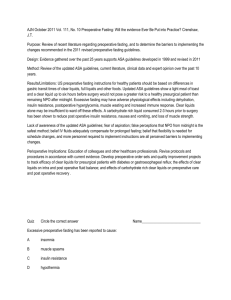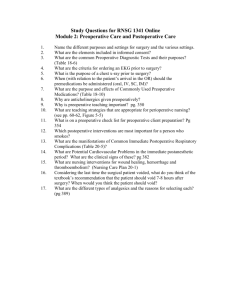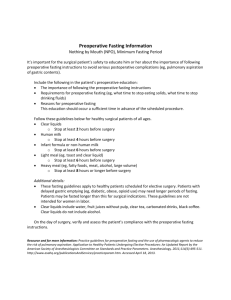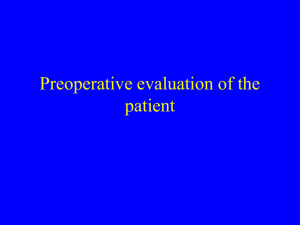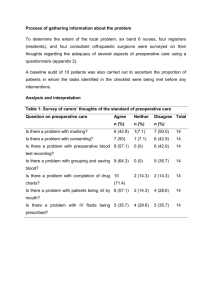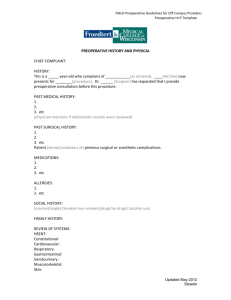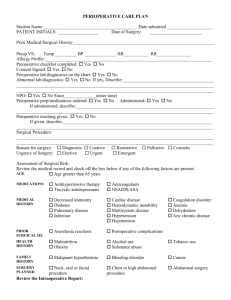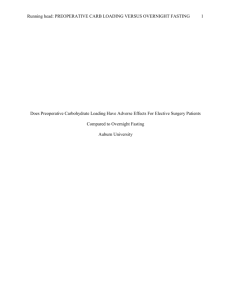Evidence-Based Practice Paper
advertisement
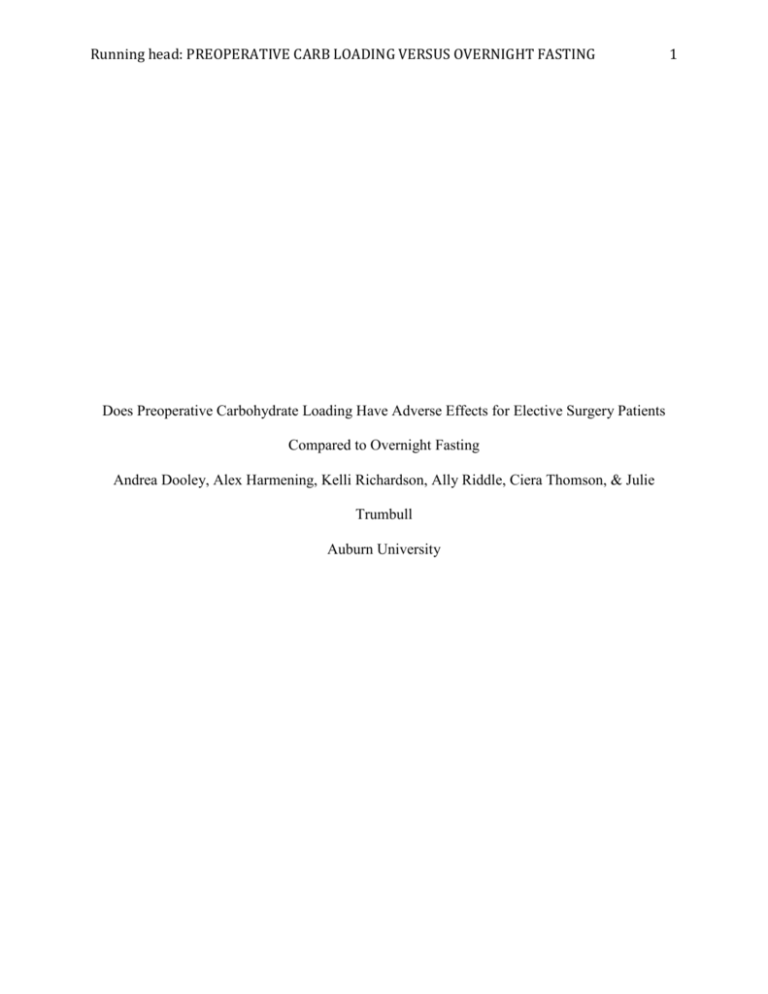
Running head: PREOPERATIVE CARB LOADING VERSUS OVERNIGHT FASTING Does Preoperative Carbohydrate Loading Have Adverse Effects for Elective Surgery Patients Compared to Overnight Fasting Andrea Dooley, Alex Harmening, Kelli Richardson, Ally Riddle, Ciera Thomson, & Julie Trumbull Auburn University 1 PREOPERATIVE CARB LOADING VERSUS OVERNIGHT FASTING 2 PICO Question and Significance Based on the most recent statistics from the National Center for Health Statistics of the U.S. Center for Disease Control, over 40 million elective procedures are performed in the United States annually. Because elective surgeries are planned and not emergent, special precautions are taken preoperatively to reduce the risk of surgical complications. Currently, preoperative fasting is the customary practice used to prevent perioperative pulmonary aspiration in adults (Oyama et al., 2011). The American Society of Anesthesiologists Committee on Standards and Practice Parameters (ASA, 2011) states that clear liquids be withheld two hours prior to procedure, light meals be withheld six hours prior to procedure, and fried, fatty foods and meat be withheld eight hours prior to procedure to ensure gastric emptying. However, as new practices emerge, evidence-based practice nurses must reevaluate the benefits and risks of current preoperative fasting standards. While preoperative fasting has been proven effective in the prevention of pulmonary aspiration, patients often report discomfort and hunger. According to Helminen, Viitanen, and Sajanti (2009), patients who were fasting became hungry, thirsty, tired, weak, and anxious before surgery. Although current guidelines only require a six to eight hour fasting time, this period may be prolonged due to unexpected delays in initiation of surgery increasing patient discomfort (Yagci et al., 2008). Preoperative fasting has also been linked to the development of insulin resistance. Bilku, Dennison, Hall, Metcalfe, and Garcea (2014) define insulin resistance as a central metabolic change caused by stress on the body that leads to hyperglycemia in non-diabetic patients. This complication leads to prolonged recovery and length of stay, and consequently increases overall cost of the procedure (Helminen et al., 2009). PREOPERATIVE CARB LOADING VERSUS OVERNIGHT FASTING 3 From this evaluation, the evidence-based practice nurse must ask oneself if preoperative fasting is truly the best practice for patients undergoing elective surgery. If the answer is no, then the nurse must determine which technique will be more beneficial. One alternative technique to preoperative fasting is preoperative carbohydrate loading. Researchers explain that the aim of preoperative carbohydrate loading is to trigger the insulin response in order to reduce insulin sensitivity during the perioperative period (Helminen et al., 2011). Another study also suggests that preoperative carbohydrate loading reduced postoperative nausea and vomiting and antiemetic consumption during the preoperative period, while posing no threat of pulmonary aspiration (Yilmaz, et al., 2013). Because this is a relatively new technique in regard to preparation for elective surgeries, current guidelines governing the practice could not be found. However, most studies provided a carbohydrate beverage two hours prior to procedure. This gives rise to the question of whether preoperative carbohydrate loading (I) is more effective in lessening adverse effects (O) in patients undergoing elective surgery (P) than the routine six to eight hour preoperative fasting guidelines (C). Because nursing care should be patient-centered, a major significance of this evidence-based practice, or PICO, question is to determine which practice optimizes patient comfort and satisfaction. Because many surgical complications lead to a need for increased resources and extended length of stay, it is essential to determine which practice is most effective in the prevention of these problems in order to provide efficient and cost-effective nursing care. Review of Evidence The research for this project was conducted using the Auburn University online library databases. The databases searched were PubMed, CINAHL, Cochrane, and MEDLINE (EBSCO). Key words searched were “preoperative”, “carbohydrate loading”, 4 PREOPERATIVE CARB LOADING VERSUS OVERNIGHT FASTING “carbohydrate therapy”, “fasting”, “glucose”, and “adverse effects”. The search was narrowed through filtering articles published within the past ten years. Through these research guidelines, we found three experimental studies, two randomized control trials, and two systematic review articles that were used to conduct our research. Further, one of the randomized control trials is a double blind trial, one of the experimental studies is a cross over randomized order, one of the systematic reviews reviewed randomized clinical trials, and the other systematic review was a meta-analysis systematic review. Finally, clinical guidelines for “preoperative fasting” were found from The National Clearing House Guidelines, but no specific guidelines for “carbohydrate loading” were accessed. 5 PREOPERATIVE CARB LOADING VERSUS OVERNIGHT FASTING Evidence Grid: Effects of Preoperative Oral Carbohydrates and Trace Elements on Perioperative Nutritional Status in Elective Surgery Patients Authors of Purpose of Research elements: Major findings/ Give strengths and article/Yr study/research *Design *Population findings relevant to your weaknesses of this questions *sampling method project article for your Level of *sample size *description of project related to evidence methods/interventions (if any) validity, bias and *instruments used applicability *outcomes measured Yoshimasa Oyama Hideo Iwasaka Keisuke Shihara Satoshi Hagiwara Nobuhiro Kubo Yutaka Fujitomi Takayuki Noguchi (2011) Level of Evidence: Level III Kelli Richardson The aim of this study was to evaluate the effects of an 18% carbohydrate (CHO) drink containing trace elements on preoperative nutritional state and trace element levels as compared with conventional fasting protocol. Design: This is a posttest only experimental design. Population: The elective surgery patients, between the ages of 20 and 89, a BMI between 18 and 35, and American Society of Anesthesiologist (ASA) physical status classification 1-3. Excluded patients were those with diabetes, abnormal glucose tolerance, upper gastrointestinal disease, ileus, use of drugs that delayed gastric emptying, and those needing to begin fasting two days preoperatively. Sampling method: Patients were chosen against selection and exclusion criteria, listed above. This was a nonprobability convenience sample because it only consists of patients from the one hospital where the study was conducted. No further information was given about the sampling method. Preoperative consumption of a drink containing CHO has been reported to suppress surgical stress-induced catabolism, thereby attenuating insulin resistance. This treatment also enhanced postoperative recovery and shortened hospitals stays. This study showed that preoperative drink supplementation can mitigate the stress experienced by patients before surgery, thus improving their perioperative experience. Higher serum Zn concentrations were observed in the CHO groups, suggesting that ingesting a CHO drink with trace elements may maintain ZN storage in bone, muscle, and the liver, aiding in wound By grouping subjects according to morning or afternoon surgery, seasonal fluctuations in metabolism may have influenced the results. In addition, the post-operative observation period was short, so the longterm effects of CHO consumption, such as days hospitalized or would healing, were not assessed. Longterm studies at multiple hospitals/institutions will be needed to confirm these findings. 6 PREOPERATIVE CARB LOADING VERSUS OVERNIGHT FASTING Sample Size: The sample size was 122 patients having elective surgery. Description of methods/interventions: The 122 patients were divided into 2 groups, one receiving the CHO drink and one using conventional fasting protocol, and then further divided into AM/PM surgery times. The patients receiving the CHO drink 2-3 hours before surgery. Blood glucose, nonesterified fatty acid, RBP, Zn, Cu, BUN, and Creatinine were collected immediately after anesthesia induction and again the following morning. A questionnaire was used to assess patient discomfort before surgery, asking about thirst, hunger, and anxiety. Instruments used: Patients were placed into a category by nominal measures: AM/PM surgery, and CHO/fasting. A Likert scale was used to receive responses about preoperative discomfort in a questionnaire. Intervals were used to record preoperative and postoperative trace element levels and nutritional status. Outcomes: Compared to the conventional preoperative fasting , preoperative consumption of a CHO drink containing trace elements healing postoperatively. This study showed that there were no adverse affects to ingesting the CHO drink preoperatively, so it could be used on all patients to give additional benefits. PREOPERATIVE CARB LOADING VERSUS OVERNIGHT FASTING suppressed preoperative metabolic fluctuations without causing adverse effects, and trace element deficiency was circumvented. 7 8 PREOPERATIVE CARB LOADING VERSUS OVERNIGHT FASTING Evidence Grid: Randomized control trial of preoperative oral carb treatment in major abdominal surgery Authors of Purpose of Research elements: Major findings/ article/Yr study/research *Design *Population findings relevant to your questions *sampling method project Level of evidence *sample size *description of methods/interventions (if any) *instruments used *outcomes measured S. Mathur, L. D. The purpose of Design-Double-blind The median duration of Plank, J. L. this study was to randomized controlled trial hospital stay for carbohydrate McCall, P. investigate the Population- Patients having loading patients was 7 days Shapkov, K. effects of elective major abdominal and the median for the McIlroy, L. K. preoperative surgery placebo group was 8 days. Gillanders, A. E. carbohydrate Sampling method- Patients There was not a large H. Merrie, J. J. loading on clinical undergoing major elective difference in postoperative Torrie, F. Pugh, J. outcome after surgery or hepatic resection fatigue, biochemistry, grip B. Koea, I. P. major abdominal at Auckland City Hospital or strength and mid-arm muscle Bissett and B. R. surgery. Mercy Hospital, Auckland conference or total body Parry (2010) Sample Size- 162 were protein in the two groups. randomly assigned, however Overall preoperative Level of 76 in the carbohydrate group carbohydrate loading Evidence: II and 79 in the placebo group treatment did not improve were used in the experiment fatigue and duration of hospital stay. While it did not Instruments usedCarbohydrate loading and improve these it also did not placebo substance the night have a negative effect on before the surgery and 2 them either. Julie Trumbull hours before anesthesia was given Outcomes measuredeffects of carbohydrate loading on fatigued and discomfort, duration of Give strengths and weaknesses of this article for your project related to validity, bias and applicability Strengths and validity: 1) Large sample size (162) 2) True randomized control trial 3) Double blind trial Weaknesses: 1) Samples were only taken from 2 hospitals 2) The procedures in the surgeries varied Significance for this project: Preoperative carbohydrate loading has neither positive nor negative effects postoperatively. PREOPERATIVE CARB LOADING VERSUS OVERNIGHT FASTING hospital stay, biochemistry, grip strength and mid-arm muscle conference, and total body protein. The primary ones measured were fatigued and duration of hospital stays. 9 PREOPERATIVE CARB LOADING VERSUS OVERNIGHT FASTING Evidence Grid: Effect of preoperative intravenous carbohydrate loading on preoperative discomfort in elective surgery patients Authors of Purpose of Research elements: Major findings/ Give strengths and article/Yr study/research *Design *Population findings relevant to your weaknesses of this article questions *sampling method project for your project related to Level of evidence *sample size validity, bias and *description of applicability methods/interventions (if any) *instruments used *outcomes measured Heli Helminen, The purpose of this This was a prospective, During the wait before This study examined several Hanna Viitanen study was to compare randomized study that surgery, the carbohydrate-rich weaknesses that should be and Juha Sajanti three different types included 210 patients drink group reported taken into account. For of preoperative from Seina ̈joki Central decreasing thirst but example, certain variables 2009 fasting protocols: Hospital. Inclusion increasing hunger and mouth such as pre-operative overnight intravenous criteria were adults dryness (P < 0.05). However, anxiety can be complex and Level of 5% glucose infusion undergoing elective the CHD group was less can vary significantly Evidence: Level (1000 ml), surgery and who were Ihungry than the fasting group according to certain patient II carbohydrate-rich III according to ASA. (P = 0.011). The intravenous characteristics and drink (400ml) and Patients were randomly glucose group also showed backgrounds. The study overnight fasting. assigned to one of the increasing thirst, mouth also failed to fully evaluate Ciera Thomson The subjective three treatment groups. dryness, and anxiety (P < the safety of preoperative feelings of thirst, Patients with overnight 0.05). In the fasting group, drinking before anesthesia hunger, mouth glucose infusion were thirst, hunger, mouth dryness, and cannot deem it safe for dryness, weakness, given 1000 ml of IV 5% weakness, tiredness and all persons with various tiredness, anxiety, glucose solution (1⁄4200 anxiety increased (P < 0.05). diseases. Furthermore, the headache and pain of kcal) between midnight Both glucose and insulin study only took place at one each patient were and 6 a.m. Patients in the levels were significantly hospital. Overall, this study questioned and carbohydrate-rich drink increased with the CHD group was very applicable to our recorded. Serum (CHD) group were given and intravenous glucose research topic because it glucose and insulin nothing after midnight and group. evaluated not only carblevels were measured a 12.5% CHD that is Overall the intravenous loading verses fasting, but preoperatively as 400ml (1⁄4200 kcal), glucose infusion does not compared a carbohydratewell. between 6 and 7 a.m. decrease the sense of thirst rich drink with intravenous 10 11 PREOPERATIVE CARB LOADING VERSUS OVERNIGHT FASTING Patients in the fasting group were given nothing by mouth after midnight. The patients were asked to score their subjective sense of discomfort with a visual analogue scale during the study. Thirst, hunger, dryness of mouth, weakness, tired- ness, anxiety, headache and pain were the variables tested. They were recorded in the evening (10 p.m.) before operation and in the morning (6 a.m.). and hunger as effectively as a carbohydrate-rich drink but does alleviate the feelings of weakness and tiredness compared with fasting. glucose and how those two results compared to preoperative fasting. PREOPERATIVE CARB LOADING VERSUS OVERNIGHT FASTING Evidence Grid: Effects of preoperative carbohydrate loading on glucose metabolism and gastric contents in patients undergoing moderate surgery: a randomized, control trial Authors of Purpose of Research elements: Major findings/ Give strengths and article/Yr study/research *Design *Population findings relevant to your weaknesses of this article questions *sampling method project for your project related to Level of evidence *sample size *description validity, bias and of methods/interventions (if applicability any) *instruments used *outcomes measured Gokhan Yagci, The purpose of This article is a randomized There were no adverse effects The article addresses several M.D., Mehmet this study was to control trial. The population reported by the treatment limitations in the study. Fatih Can, M.D., evaluate the safety consisted of patients in the group. The plasma glucose They did not attempt to Erkan Ozturk, and effects hospital undergoing surgery levels were significantly determine if the M.D., Birgul Dag, preoperative that was classified according higher in the treatment group carbohydrate loading was an M.Sc., Taner carbohydrate to the American Society of (initial 86.06 -10.9 mg/dL, advantage in overall patient Ozgurtas, M.D., loading has on Anesthesiologists (ASA) as a final 83.03 - 8.2 mg/dL) than outcome. This could be Ahmet Cosar, patients score of I or II. Patients with in the control group (initial considered a weakness for M.D., and Turgut undergoing diabetes mellitus or a history 74.12 - 24.1 mg/dL, final our project however they Tufan, M.D. standardized of any gastric or endocrine 70.85 - 22.3 mg/dL). Serum thoroughly evaluated the moderate surgery. disorder that might influence insulin levels were elevated effect the treatment had on 2008 This study also the metabolic measurements initially in the test group but glucose and insulin levels. sought to establish were excluded. Seventy returned to control levels by The study also failed to Level of current guidelines patients from a hospital in the time of anesthesia thoroughly test each patient Evidence: Level for the Turkey were included in this induction. The two groups for possible gastric II preoperative care study. They were randomly did not have a significant emptying problems, which of patients. assigned into two different difference in gastric residue could have interfered with groups. The treatment contents or gastric pH, results. Glucose and insulin Ciera Thomson group, thirty-four patients, suggesting the procedure to be levels were recorded by received a carbohydrate-rich safe in terms of aspiration investigators who were beverage on the evening risk. blinded to the study group before surgery and 2 hours in order to prevent biases. before the induction of anesthesia. Thirty-six 12 PREOPERATIVE CARB LOADING VERSUS OVERNIGHT FASTING patients in the control group underwent surgery after overnight fasting. The preoperative residual gastric contents were measured and during the perioperative period and anesthesia induction, plasma glucose and serum insulin levels were obtained. 13 PREOPERATIVE CARB LOADING VERSUS OVERNIGHT FASTING Evidence Grid: Effect of preoperative carbohydrate loading on the management of blood glucose and body temperature Authors of Purpose of Research elements: Major findings/ Give strengths and article/Yr study/research *Design *Population findings relevant to your weaknesses of this article questions *sampling method project for your project related to Level of evidence *sample size *description validity, bias and of methods/interventions (if applicability any) *instruments used *outcomes measured Design: crossoverYatabe T., The purpose of randomized order 1. It was found that Weaknesses: Tamura T., and this experiment Population: 6 healthy aggravation of postoperative 1.) The studies only Yokayama M. was to investigate volunteers insulin resistance could be included 6 patients which (2013). Effect of the effects of Experiment 1 Methods: alleviated with adequate decreases the validity of the preoperative preoperative Carbohydrate beverages control of intraoperative experiment carbohydrate carbohydrate were given both in the blood glucose levels. If 2.) The study on loading on the loading on the evening and morning, and no intraoperative blood glucose hypoglycemia was management of patient’s blood administration. The amounts levels can be controlled then conducted on rats and rats blood glucose and glucose. of administered carbohydrate postoperative glucose control metabolism is five to body temperature. beverage in the evening on becomes easier leading to less sevenfold that in humans, so JA Symposium. the day before the test and in infection and decreased it is necessary to clinically 28, 148-151. the morning of the day of the hospital stay. examine the extent of the DOI: 10. test were defined as 800 ml 2. Preoperative carbohydrate effect on humans 1007/s00540-013and 400 ml. loading is a low cost, simple, 1470-3 Results: the intake of and easy approach for the Strengths: carbohydrate beverage in the improvement of insulin 1) The experiment used Level of morning of the test day resistance and prevention of different percentages of evidence: Level II might alleviate aggravation perioperative hypothermia, carbohydrate beverages of insulin resistance as which may lead to improved allowing us compare the Andrea Dooley significantly as 3.2 prognosis in perioperative results to a patient who is mg/kg/min patients NPO. Experiment 2 methods: 6 3. Glucose infusion rate was healthy volunteers were higher in group A indicating separated into 2 groups: that insulin resistance 14 15 PREOPERATIVE CARB LOADING VERSUS OVERNIGHT FASTING group A and group B. Group A was given 375 ml of an 18% carbohydrate beverage (67.5 g carbohydrate) and 250 ml of an 18% carbohydrate beverage (45 g carbohydrate) were administered at 21:00-24:00 before the test day and at 6:30 on the morning of test day. In group B, the subjects consumed only water and tea after 21:00 on the day before the test. Experiment 2 Results: Glucose infusion rate was significantly higher in group A than group B which indicated that insulin resistance improved with the 18% carbohydrate beverage compared to fasting improved with the 18% carbohydrate beverage 4. Carbohydrate loading with a 12.6% carbohydrate beverage the morning of the test day can alleviate aggravation of insulin resistance PREOPERATIVE CARB LOADING VERSUS OVERNIGHT FASTING Evidence Grid: Preoperative carb loading: a review of the current evidence Authors of Purpose of Research elements: Major findings/ article/Yr study/research *Design *Population findings relevant to your questions *sampling method project Level of *sample size *description evidence of methods/interventions (if any) *instruments used *outcomes measured Shanley S. The purpose of Design: systemic manner of 1. Reduced insulin sensitivity (2009). this study was to randomized clinical trials has been associated with Preoperative review the current Sampling method: 16 increased surgical outcome carbohydrate evidence relating randomized control trials. 13 and enhanced patient loading: a review to preoperative randomized trials all recovery of current carbohydrate measured clinical outcomes 2. Preoperative carbohydrate evidence. Journal loading, after a preoperative loading could reduce post of Human particularly carbohydrate load 2-3 hours operative insulin resistance Nutrition ad focusing on prior to elective surgery. The 3. No adverse effects were Dietetics. 22, outcomes other 3 groups were seen with pre operative carb 256-275. including excluded. Nine of the 13 loading postoperative studies had a placebo group Level of complications, and six studies had a control evidence: Level I patient wellbeing group and length of Sample size: the number of Andrea Dooley hospital stay. patients included in each study varied greatly, from 12-252 Results: a preoperative carbohydrate load could reduce post- operative insulin resistance - None of the trials noted any adverse affects as a result of preoperative carbohydrate load therefore 16 Give strengths and weaknesses of this article for your project related to validity, bias and applicability Strengths: 1) The body of evidence surrounding reduced insulin resistance was of good quality and was consistent with other studies 2) The post operative regimen was similar in all 13 studies and was standardized in study groups Weakness: 1) Individual studies did not provide significant evidence with regard to reduced length of stay, reduced loss of lean muscle mass and patient well being, so more research on these topics will need to be done 2) Seven studies had unequal sample sizes between comparison groups PREOPERATIVE CARB LOADING VERSUS OVERNIGHT FASTING indicating that overnight fasting guidelines in elective surgery should be questioned 17 PREOPERATIVE CARB LOADING VERSUS OVERNIGHT FASTING Evidence Grid: Preoperative carbohydrate nutrition reduces postoperative nausea and vomiting compared to preoperative fasting Authors of Purpose of Research elements: Major findings/ Give strengths and article/Yr study/research *Design *Population findings relevant to your weaknesses of this article questions *sampling method project for your project related to Level of evidence *sample size *description validity, bias and of methods/interventions (if applicability any) *instruments used *outcomes measured Yilmaz, N. , The purpose of Design: The study has an There were no significant Strengths: 1.) The patients, Cekmen, N., this study was to experimental design. differences in gastric pH and researchers, and staff were Bilgin, F., Erten, compare the Population: The population residual volume between blind to the fasting and E., Ozhan, M. O., effects of is patients undergoing patients in group F and carbohydrate drink, which & Cosar, A. preoperative CHO elective laparoscopic patients in group C. decreases bias in (2013) loading (400ml cholecystectomy. However, less preoperative measurement and drink given 2 h Sampling: Patients were anxiety was reported by interpretation of results. prior to surgery) randomly assigned to two patients in group C. There Weaknesses: 1.) This study and preoperative groups according to a was no significant difference was only conducted on LOE: Level II fasting (8 h prior computer generated in VDS scores and antiemetic patients undergoing elective (RCT) to surgery) on randomization list: group F consumption during the laparoscopic postoperative (fasting) or group C PACU period, but overall cholecystectomy. While the gastric pH and (carbohydrate drink). The VDS scores and antiemetic study gave good evidence Ally Riddle residual volume, sample size for this study consumption was much lower regarding preoperative nausea and was 40 patients. Group F in group C than group F 24 h carbohydrate loading and vomiting, and and group C consisted of 20 after the procedure. Group C this procedure, it may not be antiemetic patients each. Patients, reported greater patient applicable to other consumption in researchers, and nursing staff satisfaction and less anxiety procedures. 2.) This study patients were all blinded to the than group F. The fact that no only consisted for 40 undergoing fasting and carbohydrate complications arose during participants. The validity of laparoscopic drink. surgery supports that oral the study would be cholecystectomy. Interventions: Patients in intake of 400mL carbohydrate increased if the sample size group F were placed NPO drink 2 h prior to elective were larger. for 8 h prior to surgery. surgery did not increase the Patients in group C were risk of aspiration. 18 PREOPERATIVE CARB LOADING VERSUS OVERNIGHT FASTING given 400 mL of an oral carbohydrate solution containing 12.5% glucose 2 h prior to surgery. All other preoperative procedures were consistent for both groups. Instruments: A 16-Fr nasogastric tube was placed to obtain gastric residue. A urine pH meter was used to measure gastric pH. Verbal Descriptive Scale (VDS) and State-Trait Inventory were used to measure nausea and anxiety. VDS was also used to measure the severity of the nausea. Postoperative nausea and vomiting scores were measured while patients were in PACU and 24 h after the procedure. Antiemetic consumption was documented by PACU nurse. Outcomes: Outcomes measured in this study include: preoperative anxiety, gastric pH and residual volume, postoperative nausea and vomiting, and antiemetic consumption. 19 PREOPERATIVE CARB LOADING VERSUS OVERNIGHT FASTING Evidence Grid: Practice guidelines for preoperative fasting and the use of pharmacologic agents to reduce the risk of pulmonary aspiration: application to healthy patients undergoing elective procedures Authors of Purpose of Research elements: Major findings/ Give strengths and article/Yr study/research *Design *Population findings relevant to your weaknesses of this article questions *sampling method project for your project related to Level of evidence *sample size *description validity, bias and of methods/interventions (if applicability any) *instruments used *outcomes measured American society To enhance the Design: Clinical practice Recommended minimum Strengths: The evidence of quality and guideline fasting times: and guidelines were both Anesthesiologists efficiency of Population: Healthy patients Clear liquids—2 hours externally and internally Committee on anesthesia care of all ages undergoing Breast milk—4 hours peer reviewed, which Standards and To stimulate elective procedures Infant formula—6 hours increases validity. Practice evaluation of Sampling method: HandNon-human milk—6 hours Weaknesses: The Parameters clinical practices searches of published Light meal—6 hours recommendations published To reduce the literature and searches of Fried, fatty foods or meat—8 in the guidelines were LOE: Level I severity of electronic databases hours formulated based on expert complications Sample size: Total of 158 Benefits of preoperative consensus, but were not related to articles contained findings fasting include decreased ranked. This may decrease Ally Riddle perioperative directly related to at least one frequency and severity of the applicability of the pulmonary of the evidence linkages complications related to guidelines. aspiration of pulmonary aspiration of Bias may be present within Description of gastric contents gastric contents and the guidelines because some interventions: Instruments: To measure minimization of perioperative articles evaluated were strength of evidence, articles morbidity. opinion articles. were first divided into two Potential harms of categories: scientific or preoperative fasting include opinion-based evidence. The risk of dehydration and scientific evidence articles hypoglycemia. were divided further into supportive, suggestive, equivocal, and insufficient 20 PREOPERATIVE CARB LOADING VERSUS OVERNIGHT FASTING literature. The opinion-based evidence articles were further divided into expert opinion, membership opinion, or informal opinion. To analyze the evidence, literature was categorized according to the proximity or directness of the outcome to the intervention. Articles were ranked on a scale from 1-4. A ranking of 1 represents a direct comparison either between an intervention and a clinical outcome, or between two outcomes, and a ranking of 4 represents insufficient evidence to evaluate and cause-and-effect relationship. Outcomes: Adverse consequences of pulmonary aspiration (pneumonia, respiratory disabilities, related morbidity), volume and acidity of gastric contents, adverse effects (thirst, hunger, nausea, vomiting), adverse outcomes (pneumonitis, mortality), length of hospital stay, costs 21 22 PREOPERATIVE CARB LOADING VERSUS OVERNIGHT FASTING Evidence Grid: Role of preoperative carbohydrate loading: a systematic review Authors of Purpose of Research elements: Major findings/ article/Yr study/research *Design *Population findings relevant to your project questions *sampling method Level of *sample size evidence *description of methods/interventions (if any) *instruments used *outcomes measured Bilku, The purpose of Design: randomized This review concludes that the Dennison, t his research control trials, administration of oral carbohydrate Hall, Metcalfe, is to appraise experimental design drinks before surgery is probably Garcea (2013). data from Population: Any safe because the drink leaves the different patient included in an stomach in 90 minutes and does not Level I studies article on pubmed affect gastric acidity. It also may evidence (it is regarding the have a positive influence on a wide Sampling method: a meta analysis safety and Nonprobability range of preoperative markers of systematic beneficial role convenience sampling clinical outcome. review). of preoperative Sample size: 1,445 INSULIN RESISTANCE carbohydrate patients who met Six out of seven articles loading in inclusion criteria demonstrated a specific reduction in Alex patients insulin resistance following the use Description of Harmening undergoing methods/interventions: of preoperative carbohydrate loading. surgery, and, I think this is non One study demonstrated no effect of where possible, probability sampling carbohydrate loading to insulin make because the review has sensitivity however this could be due comparison limited the population to a type II error. with placebo or to only patients who GASTRIC EMPTYING: traditional were included in data All five studies reported no practice. found on pubmed, not difference in gastric emptying times all patients undergoing between the groups that received surgeries that used placebo or fasting from midnight to Give strengths and weaknesses of this article for your project related to validity, bias and applicability Internal validities of history and selection bias are ruled out because the review excluded all trials that had patients with with metabolic disorders including diabetes mellitus, ASA grade > 2 (American society of anesthesiologists), gastrooesophageal reflux disease and those with factors affecting gastric emptying (obesity, pregnancy, sliding hernia of stomach, and medications) these factors all increase risk of aspiration. However this still leaves the internal threat of instrumentation since the data in this review was collected using different methods. 23 PREOPERATIVE CARB LOADING VERSUS OVERNIGHT FASTING carbohydrate loading. The sampling method used was any patient included in articles on pubmed that fell under keywords ‘carbohydrate loading’, ‘preoperative’, ‘surgery’, and ‘insulin resistance’ and were written before September 2011 Outcomes measured: The effect of preoperative carbohydrate loading on insulin resistance, gastric emptying, gastric acidity, patient wellbeing, immunity and nutrition following surgery. groups that had intravenous glucose or carbohydrate drinks. GASTRIC ACIDITY: The three studies included demonstrated no difference in gastric acidity following a carbohydrate drink compared with a placebo, intravenous glucose or fasting. PATIENT WELLBEING: Eight studies examined the impact of carbohydrate loading to patient wellbeing. The studies measured wellbeing using the VAS (VAS assesses thirst, hunger, anxiety, depression, pain, tiredness, weakness, inability to concentrate, mouth dryness, and nausea) and the Beck questionnaire that consists of 21 questions addressing symptoms such as fatigue and irritability. It was determined that preparation with carbohydrate led to a significant reduction in thirst, hunger, anxiety, and malaise in two trials in which carbohydrate loading was compared with fasting and placebo. IMMUNITY AND CLINICAL OUTCOME: Two trials determined there was no difference in the incidence of postoperative infections in patients using carbohydrate loading or with a placebo group One study demonstrated that preoperative treatment with This study has external validity because its results can be generalized to any patient receiving surgery. PREOPERATIVE CARB LOADING VERSUS OVERNIGHT FASTING carbohydrate drinks can lead to reduced hospital stay compared to using placebo or water. NUTRITION: No real significant differences. DIABETIC PATIENTS: One trial found that administration of carbohydrate drink 180 minutes before anesthesia in uncomplicated diabetes patients is safe. OVERALL: **NO studies analyzed in the review reported any adverse events following ingestion of carbohydrate drinks or proven aspiration during or after surgery.** 24 PREOPERATIVE CARB LOADING VERSUS OVERNIGHT FASTING 25 Synthesis of Evidence Standard practice in many surgical institutions states that patients undergoing general anesthesia for a surgical procedure must begin fasting a minimum of six to eight hours before the surgery or even as early as the night before. While these traditional fasting protocols have been successful in the past decades, experts are beginning to reconsider and suggest new protocols in place of fasting. As a starting place, shorter fasting times, along with intake of water, black coffee, tea, or fruit juice without pulp was advised for up to three hours before anesthesia induction, showing no increase in risk for pulmonary aspiration (Oyama et al., 2011). These practices, which are being recommended by anesthesiology societies in many developed countries, are now being questioned for effectiveness. Wide ranges of studies are currently being done to test for a new protocol: preoperative carbohydrate loading. Preoperative consumption of a carbohydrate (CHO) drink are being recommended by The Enhanced Recovery After Surgery (ERAS) critical care protocol (Oyama et al., 2011). Not only are these CHO drinks providing decreased insulin resistance in the perioperative period, enhanced recovery and reduced duration of hospitalization have also been reported. Patients receiving CHO drinks preoperatively are showing decreased insulin resistance, decreased levels of preoperative anxiety, fewer subjective feelings of thirst, hunger, and dry mouth, and no increase in aspiration risk, as compared to those patients undergoing traditional overnight fasting. A crossover-randomized study found that aggravation of insulin resistance could be alleviated with adequate control of intraoperative blood glucose levels. If intraoperative blood glucose levels are better controlled, then postoperative glucose control becomes easier, leading to fewer infections and decreased hospital stay (Yatabe, Tamura, & PREOPERATIVE CARB LOADING VERSUS OVERNIGHT FASTING 26 Yokayama, 2013). Preoperative CHO loading is a low cost, simple, and easy approach for the improvement of insulin resistance, providing improved prognoses in perioperative patients. In a systematic review of 16 randomized control trials, postoperative complications, patient wellbeing, and length of hospital stay were all studied related to preoperative CHO loading. Each of the 16 trials resulted in the same conclusion: a preoperative CHO load could reduce postoperative insulin resistance (Shanley, 2009). Reduced insulin sensitivity postoperatively has been associated with increased surgical outcomes and enhanced patient recovery. While individual studies did not provide specific evidence with regard to reduced length of stay, it was mentioned that the postoperative regimen was the same for 13 of the 16 studies and a general enhanced recovery period was seen (Shanley, 2009). These trials also noted that no adverse side effects arose as a result of the preoperative CHO load, therefore suggesting that overnight fasting guidelines may need to be questioned. Many nutrients are important for recovering after surgery, especially trace elements such as zinc (Zn) and copper (Cu), which play a large role in wound healing. A study performed at a Japanese hospital evaluated the effects of an 18% CHO drink containing trace elements on preoperative nutritional state and trace element levels are compared with a conventional fasting protocol (Oyama et al., 2011). This treatment was reported to suppress surgical stress-induced catabolism, thus attenuating insulin resistance and improving patient outcomes postoperatively. Higher serum Zn concentrations were observed in the patients who received the CHO drink before surgery, suggesting that ingesting a CHO drink with trace elements may maintain Zn storage in the bone, muscle, and the liver, aiding in wound healing postoperatively. Along with enhanced postoperative PREOPERATIVE CARB LOADING VERSUS OVERNIGHT FASTING 27 recovery and shorter hospital stays, this study showed that CHO drink supplementation before surgery can mitigate the stress experienced by patients preoperatively, thus improving their perioperative experience as a whole (Oyama et al., 2011). Anxiety can have detrimental effects on the body, especially one that has just undergone surgery and is trying to heal itself. A study comparing three different types of fasting protocols, overnight intravenous 5% glucose infusion, morning CHO-rich drink, and overnight fasting, showed that anxiety was drastically decreased in both the glucose infusion group and the CHO-rich drink group, compared to the fasting group (Helminen et al., 2009). These reduced anxiety levels can lead to improved patient outcomes and shorter hospital stays. Of the three fasting protocols, the CHO-rich drink showed less preoperative hunger and thirst, and only mild mouth dryness. The fasting group, however, showed an increase in thirst, hunger, mouth dryness, weakness, tiredness, and anxiety, along with increased insulin resistance (Helminen et al., 2009). In a 2013 study where 40 patients were randomly assigned to either a fasting group or a CHO loading group, lower anxiety levels were reported by the 20 individuals receiving the CHO drink 2 hours before surgery, as well as significantly lower levels of antiemetic consumption 24 hours after their procedure. Participants in this group reported greater patient satisfaction and less anxiety than those who fasted eight hours prior to surgery (Yilmaz et al., 2013). In addition to all the medical benefits of CHO loading that have been found in the previous studies, it is also pertinent to mention that no complication arose during surgery in those patients who ingested the CHO drinks. Absolutely no adverse side effects were found in any of the cases in which CHO loading was chosen over preoperative fasting. In a randomized control trial performed in Turkey, 34 of its 70 participants received a CHO-rich PREOPERATIVE CARB LOADING VERSUS OVERNIGHT FASTING 28 beverage the evening before surgery and two hours before the induction of anesthesia. While these patients did not show any significant different in the serum insulin levels compared to the 36 patients who underwent overnight fasting, these was also no difference in gastric residue contents or gastric pH, suggesting that the practice of CHO-rich beverages preoperatively was safe in terms of aspiration risk (Yagci et al., 2008). A double blind randomized control trial consisting of 162 patients undergoing major elective abdominal surgery, fatigue and discomfort were measured, as well as biochemistry, grip strength, and duration of hospital stays (Mathur et al., 2010). Of the 76 patients who received the CHO drink the night before and two hours before anesthesia was given, the length of stay was slightly shorter than those who fasted overnight. Even though there were no significant differences in postoperative fatigue, discomfort, grip strength, and biochemistry with the CHO drink, no negative effects presented for these patients either. (Mathur et al., 2010). Even in its early stages of research, it is apparent that carbohydrate loading preoperatively can have significant medical benefits compared to the traditional protocol of overnight fasting. Decreased insulin resistance helps to better control glucose levels during and after surgery, leading to fewer infections and complications postoperatively, as well as overall shorter hospital stays (Shanley, 2009). Lower anxiety levels preoperatively enhance patient recovery postoperatively, leading to better surgical outcomes and higher patient satisfaction (Yilmaz et al., 2013). Fewer reports of thirst, hunger, mouth dryness, weakness, and tiredness play a role in boosting patient recovery times, leading to a shorter duration of stay for surgical patients (Helminen et al., 2009). While all the possible benefits of preoperative carbohydrate loading have yet to be discovered, the lack of adverse effects shown in these patients leads us to further question the current standard protocol of PREOPERATIVE CARB LOADING VERSUS OVERNIGHT FASTING 29 overnight fasting before surgery. Preoperative drink supplementation lends to many advantageous outcomes for patients without increasing risk for aspiration or introducing new adverse effects, possibly making it the new standard for preoperative intake protocol. Appraisal of Evidence A. The majority of the studies were well designed level I and II randomized control trials. The level I study was a systematic review of randomized control trials, which established a high level of evidence for this study. There are five level II studies including a doubleblind RCT, perspective randomized study, an experimental RCT, crossover randomized order, and an RCT. There is also one level III study, which is a post-test experimental design. This study is level III because there is no randomization in the trial. B. The majority of the studies were consistent in that there are no adverse effects or complications with preoperative carbohydrate loading. Several other studies stated that there is no significant difference in gastric content and pH levels, and therefore suggests that it is a safe procedure for aspiration risks. Most studies said that the patient’s overall experience was improved with reduced anxiety and the Verbal Descriptive Scale scores were lower. Some articles stated that patients who drank the carbohydrate rich beverage usually reported less hunger and thirst compared to those who received IV carbohydrate loading, but overall both methods decreased weakness and tiredness compared to the fasting control group. A few studies also said that preoperative carbohydrate loading could improve wound healing postoperatively and decrease infection; however, there is no significant difference in the length of hospital stays. One of the studies reported no substantial difference in the experimental and control group outcomes, suggesting that carbohydrate loading did not prove to be beneficial or harmful for preoperative patients. PREOPERATIVE CARB LOADING VERSUS OVERNIGHT FASTING 30 Overall, the majority of the studies found that carbohydrate loading can improve postoperative insulin resistance in a low cost and simple way. There is a sufficient quantity of studies that are consistent with the results to support these recommendations C. Are there identified risks? The most important identified benefit for applying evidencebased practice recommendation is the improvement of postoperative insulin resistance. With this improvement came less anxiety and overall patient satisfaction. In most studies patients reported improved satisfaction and decreased thirst, hunger, fatigue, nausea and vomiting. The studies reported that there are no identified risks or adverse effects of preoperative carbohydrate loading. D. None of the studies mentioned specific costs of preoperative carbohydrate loading. However, one study mentioned that preoperative carbohydrate loading is a low cost and simple method. Most of the studies agree that this is an easy approach to improving insulin resistance. Recommendations Some studies show that preoperative carbohydrate loading can provide benefit to patients over preoperative fasting. Articles found throughout the research make different suggestions as to carbohydrate drinks and their effects. Listed are the different recommendations found throughout the research along with a grade that determines the benefit to patients. It is recommended that a patient be given a preoperative CHO drink containing trace elements before elective surgery to suppress preoperative metabolic fluctuations (Oyama et al., 2011). This recommendation receives an A because the research is beneficial to PREOPERATIVE CARB LOADING VERSUS OVERNIGHT FASTING 31 patients. However, it is a moderate level of certainty because subjects were grouped according to morning and afternoon surgery, which would influence results. Carbohydrate loading does not need to be given to patients having major abdominal surgery because overall preoperative carbohydrate loading treatment did not improve fatigue and duration of hospital stay for abdominal surgeries (Mathur et al., 2010). This recommendation would receive a D because the beverage did not prove to benefit the patient’s malaise and duration of stay. The research was a moderate level of certainty because the sample patients were only chosen from two hospitals, not allowing for variations. In elective surgery carbohydrate beverages should be given over intravenous glucose infusions because the carbohydrate drinks showed to alleviate the feelings of tiredness and weakness post operatively and decrease the feelings of hunger and thirst more than the intravenous glucose (Helminen et al., 2009). The level of certainty of this study is high because it is a randomized study with a large sample size making it unlikely that the results will be affected by other studies. The score is a B because although the level of evidence is high, it was not tested on various disease groups, and therefore, there may not be substantial evidence for all patients. Carbohydrate beverages should be given pre operatively to increase the serum glucose levels during surgery (Yagci et al., 2008). The level of certainty for this research study is moderate because it is randomized to prevent bias but it did not evaluate how pre operative carbohydrate loading will affect the overall outcome. This recommendation gets a D because although the serum glucose levels initially increased, by the time anesthesia was induced the effects had worn off, so it cannot be determined if it would effect the patient post operatively. It is recommend that patients be given carbohydrate beverages 4-8 hours before surgery to prevent intraoperative PREOPERATIVE CARB LOADING VERSUS OVERNIGHT FASTING 32 hypothermia (Yatabe et al., 2013). This suggestion is given an I because the study was only tested on rats. Therefore more research needs to be done to really see how the technique would affect humans during surgery. The level of certainty is moderate because it is a randomized control trial. To reduce the amount of post op antiemetic medication needed, give a carbohydrate beverage prior to surgery (Yilmaz et al., 2013). This finding deserves a C because the study only observed patients that underwent a laparoscopic cholecystectomy therefore it does not prove that it will be beneficial to all patients. PREOPERATIVE CARB LOADING VERSUS OVERNIGHT FASTING 33 References American Society of Anesthesiologists Committee on Standards and Practice Parameters. (2011). Practice guidelines for preoperative fasting and the use of pharmacologic agents to reduce the risk of pulmonary aspiration: application to healthy patients undergoing elective procedures: an updated report. Anesthesiology, 114(3), 495-411. Retrieved from http://www.guideline.gov/content.aspx?id=34402&search=preoperative+fasting Bilku, D.K., Dennison, A. R., Hall, T. C., Metcalfe, M.S., & Garcea, G. (2014). Role of preoperative carbohydrate loading: a systematic review. Ann R Coll Surg Engl, 96, 15-22. doi: 10.1308/003588414x13824511650614 Helminen, H., Vitanen, H., & Sajanti, J. (2009). Effect of preoperative intravenous carbohydrate loading on preoperative discomfort in elective surgery patients. European Journal Of Anesthesiology, 26(2), 123-127. doi:10.1097/EJA.0b013e328319be16 Mathur, S., Plank, L., McCall, J., Shapkov, P., Mcllroy, K., Gillanders, L., & … Parry, B. (2010). Randomized controlled trial of preoperative oral carbohydrate treatment in major abdominal surgery. The British Journal Of Surgery, 97(4), 485-494. doi:10.1002/bjs.7026 Oyama, Y., Iwasaka, H., Shihara, K., Hagiwara, S., Kubo, N., Fujitomi, Y., & Noguchi, T. (2011). Effects of Preoperative oral carbohydrates and trace elements on perioperative nutritional status in elective surgery patients. Middle East Journal Of Anesthesiology, 21(3), 375-383. Shanley, S. (2009). Preoperative carbohydrate loading: a review of current evidence. Journal of Human Nutrition and Dietetics, 22, 256-275. PREOPERATIVE CARB LOADING VERSUS OVERNIGHT FASTING 34 Yagci, G., Can, M., Ozturk, E., Dag, B., Ozgurtas, T., Cosar, A., & Tufan, T. (2008). Effects of preoperative carbohydrate loading on glucose metabolism and gastric contents in patients undergoing moderate surgery: a randomized, controlled trial. Nutrition (Burbank, Los Angeles County, Calif.), 24(3), 212-216. Yatabe T., Tamura T., and Yokayama M. (2013). Effect of preoperative carbohydrate loading on the management of blood glucose and body temperature. JA Symposium, 28, 148-151. doi: 10. 1007/s00540-013-1470-3 Yilmaz, N., Cekmen, N., Bilgin, F., Erten, E., Ozhan, M. O., & Cosar, A. (2013). Preoperative carbohydrate nutrition reduces postoperative nausea and vomiting compared to preoperative fasting. Journal of Research in Medical Sciences 18(10), 827-832. Retrieved from http://www.ncbi.nlm.nih.gov/pmc/articles/PMC3897064/
